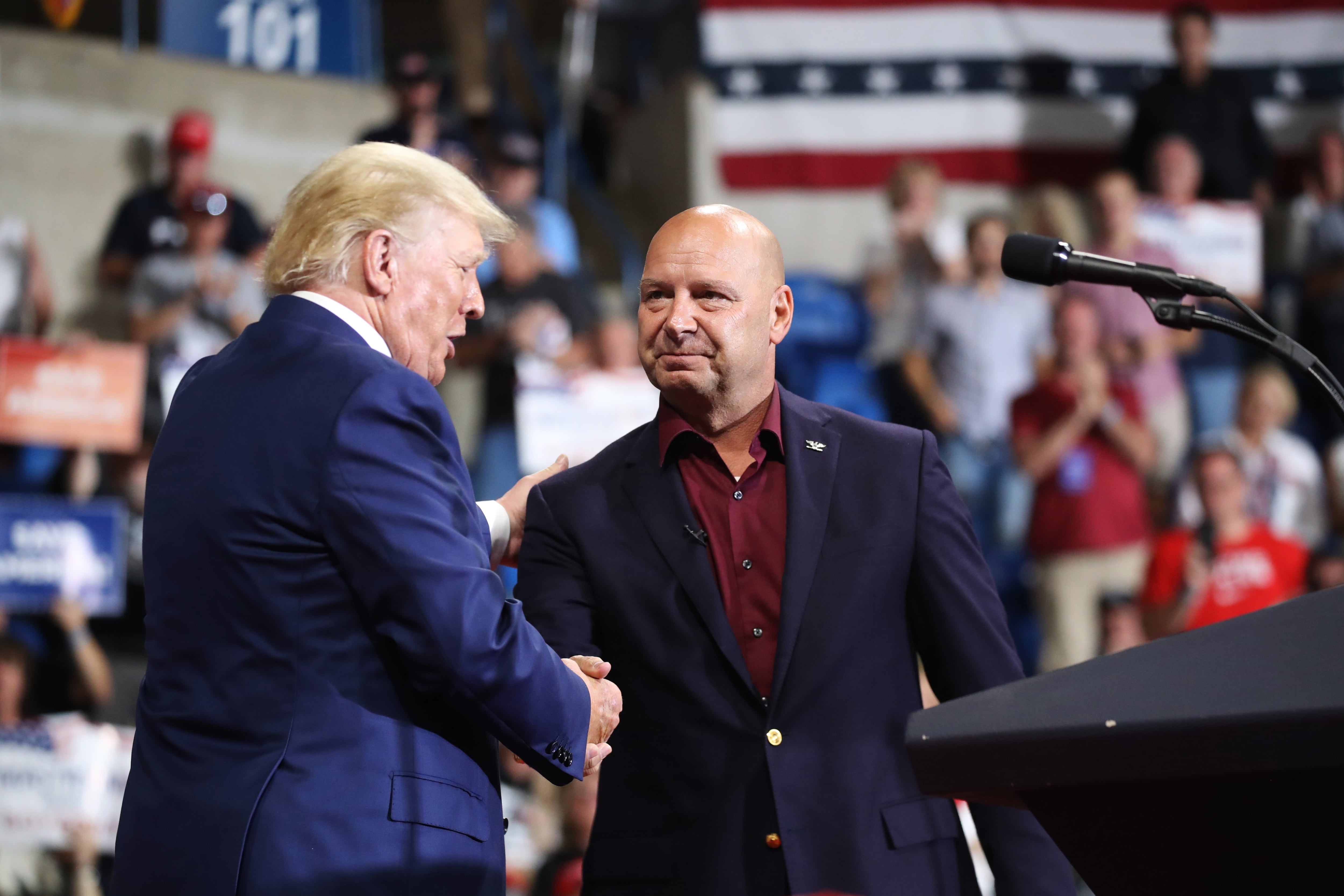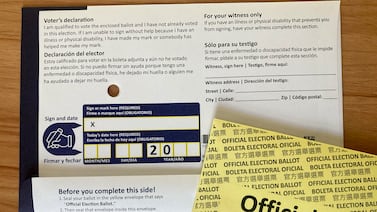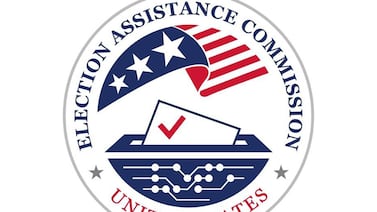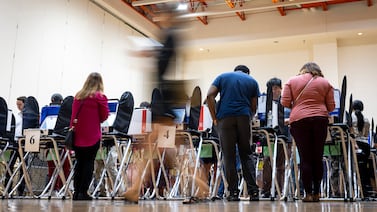When polls close at 8 p.m. on Election Day, a nearly three-week process to finalize and certify results will begin, a period in which candidates could lodge objections to certain votes and spark protracted legal fights that would draw out a normally routine process.
Such disputes have grown more likely because of continued rhetoric from the right alleging voter fraud, and after some county boards of election resisted certifying all votes from their primary elections.
GOP gubernatorial nominee Doug Mastriano, a state senator, led the charge to question election results in 2020. He sought to overturn former President Donald Trump’s loss in Pennsylvania that year, and has repeatedly suggested there will be fraud in this year’s contest. He has not said whether he will accept this year’s results.
Meanwhile,Trump held a September meeting in Trump Tower with Pennsylvania elected officials and election activists, as reported by Rolling Stone. Trump expressed concern there would be fraud in the U.S. Senate race, particularly in Philadelphia, and was preparing to launch a media campaign and legal crusade should his preferred candidate be behind in the count on election night.
Many fair elections advocates in Pennsylvania anticipate challenges in this year’s contests, and say results certification and the handling of undated mail-in ballots are particular issues to watch.
Jeff Greenburg, Mercer County’s former longtime elections director who is now a senior adviser to The Voter Project, a Pennsylvania nonprofit focused on voting access, said he is particularly concerned with the possibility of “a county that attempts to refuse to certify for some reason that is not legally viable.”
Others echoed that, including J.J. Abbott, executive director of Commonwealth Communications and Gov. Tom Wolf’s former press secretary, who noted some counties declined to certify the complete results of the primary election due to a disagreement with the state over whether to include undated mail-in ballots. The dispute included Lancaster, Berks and Fayette counties, and was settled in court.
The largest jurisdictions will certify, Abbott said, and more reluctant counties “showed their hand a bit in the primary, which now we are more prepared for.”
During a press conference in mid-October, Acting Secretary of State Leigh Chapman did not answer a question from a reporter who asked what the state would do if counties again refused to certify. A spokesperson for the department, in response to a follow-up question from Votebeat this week, said that the department “expects counties to follow the law” and they will “consider our options” if counties do not do so.
That question of whether undated or incorrectly dated mail-in ballots should be considered valid is still murky — and very likely to again lead to legal challenges over which ballots to count in tight races.
Earlier this week, Pennsylvania’s Supreme Court deadlocked over whether rejecting such undated or incorrectly dated mail-in ballots violates federal civil rights law because the date is a technicality that doesn’t speak to the eligibility of the voter. On Tuesday the court ruled counties should not count undated or incorrectly dated mail-in ballots but must segregate and retain them, a strong signal that even the state’s highest court suspects the issue is not settled.
The order to segregate the ballots “sort of portends there might be further litigation and [the state Supreme Court justices] know it,” retired federal Judge John E. Jones said in a press briefing this week hosted by Keep Our Republic, a nonprofit group.
Meanwhile, in Philadelphia, GOP lawyers are contesting the city’s decision to change a process for guarding against double voting.The city says a new state law requiring continuous counting without a break means it can no longer pause tabulation to cross-check in-person voting records against the list of mail-in ballots received. The city has taken that time-consuming extra step, known as “poll book reconciliation,” in the past, but now says the new state law precludes it, and that it is unnecessary due to other safeguards.
How election certification works
The long process that will turn cast ballots into certified election results begins after polls close Tuesday, when counties will begin uploading in-person results to their websites and that of the Department of State. Most in-person voting results should be uploaded by midnight or shortly after, Greenburg said. But the counting of all mail-in and absentee ballots received by Election Day will continue nonstop into the next day in nearly all counties, and so those initial tallies are almost certain to change.
First results are, of course, both unofficial and far from final. Beginning Friday morning, Nov. 11, counties will begin their official canvass of the election.
“The canvass is just going through and double-, triple-checking that you have all of the ballots accounted for,” said Derek Muller, a law professor at the University of Iowa who specializes in elections law. Election officials are “making sure that everything is included and that every lawfully cast ballot is included in that final tally.”
County elections offices will process provisional ballots during this time, checking to make sure the voters who cast them had not already submitted a mail-in ballot or whether the provisional ballots were somehow otherwise ineligible.
Counties will also “reconcile” their votes, meaning they will check to ensure that the number of voters recorded as having cast ballots in a given precinct matches the number of ballots counted from that precinct. Greenburg said discrepancies can sometimes arise if a voter forgets to sign the poll book when checking in.
County elections offices also perform post-election audits during this period. Counties are required to do a recount of a random sample of 2% of ballots cast or 2,000 ballots, whichever is fewer. Many counties also began conducting risk-limiting audits after the 2020 election, in which a random sample of ballots are hand-counted to ensure the totals match the results from the tabulation machine.
By the Tuesday after Election Day, Nov. 15, counties must submit results — as up-to-date as possible, but still unofficial — to the Department of State. These figures could change slightly as military and overseas ballots, which must be received by the 15th, are counted and included in the tallies.
The counties must certify the final results by Monday, Nov. 28.
Greenburg said that local boards of election, comprised of the county’s commissioners, must sign a copy of the results twice for an election to be certified. Typically, candidates raise any challenges to the canvassing process in the five-day window between the first and second signings.
Those challenges could be based on, per typical cases Greenburg has seen, allegations that tabulation machines are not operating properly in a precinct, or that a county’s reported results from a precinct do not match the number of voters who voted there.
Candidates can also use the contestation provision of the election code to lodge objections up to 20 days after an election.
“In this day and age, that could be anything,” Greenburg said. “In my era that was unheard of.”
Those objections can include things not related to the tabulation of votes, but rather the way in which the election was conducted, such as the propriety of ballots received through drop boxes or the chain of custody of votes transported from precincts to central counting locations, Greenburg said.
Marian Schneider, senior voting rights policy counsel for the Pennsylvania ACLU, said during a press briefing this week that candidates have the ability during the canvassing process to challenge decisions by the local board of elections about which votes should be counted or not, and candidates can even appeal those decisions to the courts.
One such example is the 2021 dispute in Lehigh County over undated mail-in ballots, which made its way all the way to the U.S. Supreme Court. That case was eventually dismissed as moot.
Trump’s lawyers “took advantage of those procedures in 2020 and none of those went any further,” she said. “I imagine that we can look back at the 2020 election for the kinds of things we might see again.”
In 2020, Trump’s legal team sought to block counties from certifying the vote, objected to the number and level of access for poll watchers, and tried to prevent mail-in ballots from being counted, among other challenges. Trump lost all but one of the cases he filed in Pennsylvania, with the exception being a case involving how close poll watchers could be to proceedings in Philadelphia.
Trump also tried to declare victory prior to all votes being counted, something he also urged Dr. Mehmet Oz, his endorsed candidate for U.S. Senate in Pennsylvania, to do in the primary. Oz’s campaign, however, has said he will accept the results of the election.
Abbott, who organized the press briefing with Schneider and others this week, said he thinks many of the tactics used to try to overturn Pennsylvania’s 2020 election results will not work.
“We’re trying to proactively show that a lot of these things cannot succeed or haven’t in the past,” he said.
Carter Walker is a reporter for Votebeat based in Pennsylvania. Contact Carter at cwalker@votebeat.org.








